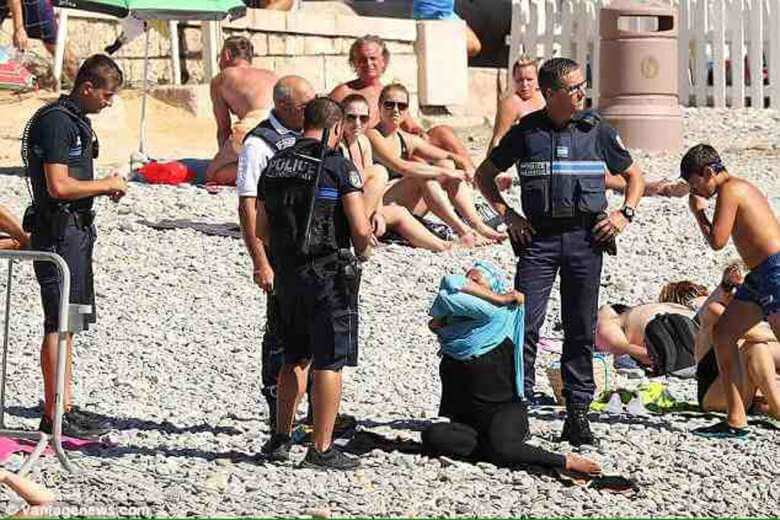

In nearby Cannes, meanwhile, another woman was lying on the beach when approached by police for wearing the same swimsuit. The crowd around her cheered as the police forced her to pull off her clothes. Her daughter, who was swimming, was left crying and humiliated.
You read that right: these women were targeted by police for wearing a swimsuit, a swimsuit that French authorities have decided to ban because they consider it to be associated with “radical Islam.” Both women were charged with wearing an “outfit not respecting good morals and secularism.”
A French court will decide on Friday whether the burkini bans are legal, after a challenge by human rights and anti-Islamophobia groups. But the French Prime Minister has come out in support of the bans, and the ban has already stirred a wave of Islamophobia (including a riot targeting a majority-North African public housing complex in Corsica).

The “burkini” was invented by a Muslim woman in Australia as a full-body swimsuit to allow women – specifically Muslim women but also those who wanted to avoid sun exposure or else just didn’t feel like wearing a bikini – to swim with the majority of their skin (except for their face) covered. It’s unclear how or why this outfit threatens “national security,” as French authorities have claimed.
It is also unclear how or why this outfit could be distinguished in any way from a simple, apparently “secular” wetsuit, or from the clothes a nun might wear while visiting the beach. Presumably, since the law targets burkinis by name (and does not, for example, specify how much skin must be shown to be legal), the only way to distinguish the three is by noting the religion of the wearer.
This attack on women’s right to choose what to wear in France has gained ground with astonishing speed. Shockingly, mainstream politicians, right-wing commentators and a variety of secular feminists have all lined up in support of the law.
Apparently, telling women what to wear – or in this case, what not to wear – is now considered good nationalism and good feminism among a large proportion of French society. Fully 64% of French nationals polled in a recent survey by Le Figaro said that they thought burkinis should not be worn on the nation’s beaches.
These incidents should be shocking to all of us. And these numbers should be shocking to all of us as well.
What will the effects of these images be on young people around the world? On this woman’s daughter? On the woman humiliated for the crime of lying on a beach wearing clothes? On Muslims wondering what “Western freedom” looks like in practice?
Those who defend the ban have been largely unable to explain why, except that they disagree with veiling and believe it to be oppressive.
But it’s irrelevant what they think about veiling. Attacking women for what they wear, for the presence or lack thereof of a piece of cloth above their head, is misogyny, pure and simple.
Do people who support the burkini ban really not understand that forcing Muslim women to unveil will have the opposite effect of what they want?
Do they not understand that forcing women wearing burkinis to take them off will prevent them from going to the beach? That it will encourage those Islamophobic idiots who already yell at, harass, follow, and beat up women wearing veils?
And that those women will thus be forced more and more to stay at home due to the virulent anti-veil sentiment brewing outside?
That using the police’s guns to humiliate people does not to lead to a conversation, it only leads to pain and anger, and rightfully so?
Arguing that women wearing cloth around their bodies is a threat to national security and to secularism doesn’t make any sense and is completely counterproductive, unless your goal is to terrify Muslim women from going outside for fear of being attacked.
Do they not realize this road has been traveled before?
In Iran, for example, in 1935 a law was passed under the secularizing regime of Reza Shah that banned the veil. In the years that followed, police ripped the veils off of thousands of women, forcing many who previously took part in society to return to their homes for fear of being humiliated for their clothing.
Many families refused to allow women to leave the home without the veil, and the state reinforced this patriarchal control over women’s bodies by discriminating against and harassing them. The patriarchy and misogyny of the family found an unlikely ally in the secularist agenda of the state.
And amidst it all, women were the victims, targeted for how they dressed, their bodies made into ideological symbols.
The trauma of the forced un-veiling remained in the public memory for decades. And it is no coincidence that years later, when the Iranian Revolution triumphed and Imam Khomeini took power in the country, mandatory veiling was introduced.
Patriarchy and misogyny breed patriarchy and misogyny, and forced unveiling emboldens and strengthens the most patriarchal and conservative aspects of society. It also strengthens the most patriarchal, misogynistic segments of Muslim societies by proving them right about secularist and Western hypocrisy regarding freedom and human rights.
France’s burkini ban is not feminism. It is not secularism. It is laique fascism, an attack on women’s bodies and women’s right to choose what to wear, and an attack on all of us who value a free, diverse, and tolerant public sphere.
We have become a mob, cheering as police force women to undress.
This is France 2016. This is the reverse side of the forced veiling coin. And this is no less violent.